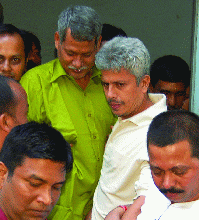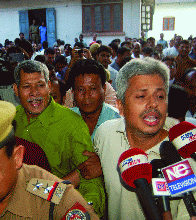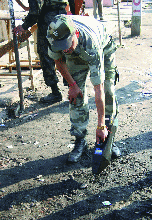Bringing ULFA to the negotiation table
Bringing ULFA to the negotiation table
 The arrest of two senior ULFA (United Liberation Front of Asom) leaders in the first week of November raised apprehensions that the banned outfit could opt for immediate disruptive activities in Assam.
The arrest of two senior ULFA (United Liberation Front of Asom) leaders in the first week of November raised apprehensions that the banned outfit could opt for immediate disruptive activities in Assam.
The outfit was angry with the Bangladesh authority as it handed over Shasha Choudhury (its foreign secretary) and Chitraban Hazarika (its finance secretary) to the BSF (Border Security Force). The Indian border security forces were reportedly waiting for them at the Tripura border and finally both the top ULFA leaders came under the custody of the Assam police.
The news of detention of Shasha and Chitraban by ‘some unidentified persons in civilian clothes’ in Dhaka broke out as sensational media headlines from the source of ULFA itself.
He requested Dhaka not to hand over Shasha and Chitraban to India citing that the Bangladesh government has no extradition treaty with New Delhi.
Surprisingly, there was no news of the arrest (of Shasha and Chitraban) in Bangladesh media and when this writer contacted a senior Dhaka based journalist with the queries, he revealed that Dhaka had not issued any statement regarding the incident. Rather, the Bengali journalist admitted that they had used the version of Raju Barua’s statement for their news space.
After a week of speculation, both Shasha and Chitraban came under the custody of Assam police. The Indian security agency came out with a statement that the two ULFA leaders surrendered to BSF jawans along the Indo-Bangladesh border (on the night of November 4), whereas Shasha Choudhury repeatedly asserted that they had not surrendered. Shasha was vocal in front of media persons, while he was taken to the judicial magistrate’s court in Guwahati.
statement that the two ULFA leaders surrendered to BSF jawans along the Indo-Bangladesh border (on the night of November 4), whereas Shasha Choudhury repeatedly asserted that they had not surrendered. Shasha was vocal in front of media persons, while he was taken to the judicial magistrate’s court in Guwahati.
Whatever may be the real sequence of events, the fact remains that an intelligent ULFA leader like Shasha Choudhury was trapped. Shasha joined the outfit in 1983 and was arrested earlier by the armed forces during the 1995 Operation Bluebird at Saiha of Mizoram. Released on bail the next year, Shasha was in charge of international communication for the benefit of the militant outfit. On the other hand, Chitraban looked after the financial aspects of ULFA. He was also temporarily serving the outfit as the General Secretary since 1997 (as Anup Chetia was arrested and imprisoned in Bangladesh). Amazingly Raju Barua added in the statement that “they were living in Bangladesh as law-abiding citizens.” It in fact vindicates the sustained campaign of the government agencies to convince Dhaka of ULFA’s presence in Bangladesh which has been going on for a long time.
During the time of detention, both Shasha and Chitraban used Muslim identities. Shasha used the identity of Rafiqul Islam, whereas Chitraban took the name of Ashfaqul Hossein. Both possessed Bangladeshi passports under their respective Muslim names.
The Indian intelligence agency continues claiming that the ULFA with few other militant groups from Northeast India run training camps and hideouts inside Bangladesh. Moreover, the militant groups used to enjoy adequate support from the Directorate General of Forces Intelligence (the military intelligence wing of Bangladesh) under the direction from the Inter Services Intelligence (of Pakistan).
According to the intelligence agency, Bangladesh is still providing a safe haven for the ULFA Chairman Arabinda Rajkhowa, its Deputy Military Chief Raju Barua, the National Democratic Front of Bodoland leader Ranjan Daimary, the National Liberation Front of Tripura leader Biswamohan Devbarma, the All Tripura Tiger Force Chief Ranjit Devbarma with some others.
The ULFA Military Chief Paresh Barua is understood to have recently left Bangladesh. After getting his name involved in the Chittagong arms seizure case, the notorious rebel leader has reportedly arrived in the southern part of China. The intelligence agency believes that Paresh Barua has been trying to seal an arms deal with a Chinese company somewhere in the Yunnan province and also the possibility of alternate hideouts there as Dhaka has turned hostile towards the outfit.
The outfit reportedly has a few camps inside Burma too. The Naga insurgents were supporting the ULFA rebels in getting training and shelter in the jungles of northern Burma. But with the improvement of New Delhi-Nay Pie Taw strategic relationship, ULFA has now found the military ruled country also unsafe.
Dhaka though, always tries to deny the fact that Bangladesh soil has been used by Northeastern militants, the present Awami League government led by Sheikh Hasina has assured New Delhi of its cooperation in this respect.
In fact, during her first term as the Prime Minister, the ULFA General Secretary Anup Chetia was arrested in December 1997 from Dhaka under the Foreigners’ Act and Passport Act of Bangladesh. Anup is still behind bars in Dhaka central jail. Even after repeated requests from New Delhi, the Bangladesh government has not handed over Anup to India (the cited reason is the absence of an extradition agreement between the two countries). Lately the ULFA leader had requested the UN High Commissioner for Refugees to grant him a refugee status and political asylum in a third country.
The ULFA leaders were definitely angered with the arrest and subsequent handing over of Shasha and Chitraban to India by the Bangladesh authority. The outfit was perhaps unaware of the ‘change of heart and policies’ of Dhaka towards New Delhi.
 The ultimate understood aim of Raju Barua’s mail was to inform the world that two ULFA leaders were arrested in Dhaka and they should be tried under Bangla rule of law (and no way handed over to Indian agencies).
The ultimate understood aim of Raju Barua’s mail was to inform the world that two ULFA leaders were arrested in Dhaka and they should be tried under Bangla rule of law (and no way handed over to Indian agencies).
He might have the intension to draw the attention of human rights groups based in Dhaka, Guwahati or elsewhere, who could come forward in support of the arrested ULFA leaders. But in reality, it did not yield any significant outcome. Frustrated ULFA leaders called for a dawn-to-dusk Asom Bandh (general shutdown) on November 9th, which received, as usual, response from the people. Abhijit Sarma, who leads an anti-terrorism forum called Assam Public Works, however expressed dissatisfaction with the ULFA’s general shutdown programme. Talking to this writer, Sarma asserted that the government has full ethical and logical reasons to take action against the cadre of a banned organization. He however admitted that the ULFA leaders might have reasons to express resentment against Dhaka, as the Bangladesh authority cheated them.
And in reality, the outfit came out with outbursts against Bangladesh. The ULFA Vice-Chairman Pradip Gogoi, who is now under imprisonment in Guwahati jail, on November 16th, said that they (ULFA) are against large-scale infiltration from Bangladesh, which had finally threatened the identity of the indigenous people of Assam, as the influx changed the demographic pattern of the state. But the outfit had never said these few lines in earlier occasions. The ULFA leaders continued their argument that all foreigners (read Nepali, Hindi speaking people from mainland India with Bangladeshis) must leave Assam and the North East. They never distinguished the hundred thousand illegal Bangladeshis with the mainland Indian population living in the state.
Astonishingly, the ULFA was formed on 7th April 1979 with an aim to establish a Swadhin Asom (independent Assam) with the help of armed struggle. All six founders (Bhimkanta Buragohain, Arabinda Rajkhowa, Paresh Barua, Anup Chetia, Pradip Gogoi and Bhadreshwar Gohain) were unanimous that all the foreigners, including the Bangladeshis, must leave Assam.
But in the course of time, the outfit became so dependent on Bangladesh (and also Pakistan) for shelter, training and arms that it lost its moral courage to stand against the illegal Bangladeshis in Assam and that way lost the base for propagating themselves as liberators of the indigenous Assamese population. There are reports that the ULFA leaders had invested a huge amount of money (which has been extorted from Assam) in various avenues including the media of Bangladesh.
To show its ‘existence and power’, the ULFA even targeted a goods train, which was carrying high-speed diesel from Numaligarh refinery in upper Assam, with explosions that resulted in the loss of around Rs 35 million. The ULFA leader Paresh Barua then called the media persons from an undisclosed location and claimed responsibility for the November 16th assault.
The latest twin blasts that shook Nalbari town (which is 70 km away from Guwahati) on November 22nd were perhaps another attempt through which the ULFA wanted to show its capability to strike even today. The explosions took place in front of the Nalbari police station and those killed seven people and wounded nearly fifty.
The police claimed on an assertive mood that this was the handiworks of the ULFA. The senior police officer (Inspector General of Police-Law and Order) Bhaskar Jyoti Mahanta claimed that preliminary investigations established the ULFA’s hand in the blasts. However, the ULFA leaders promptly denied its hands in the explosions.
First it was a local level leader Hira Sarania, who talked to the media and claimed that they were no way involved in the Nalbari blasts. Later the ULFA Chief Rajkhowa also echoed the same version. In an e-mail statement, Rajkhowa even went so far as to condemn the incident ‘in which innocent indigenous Assamese people were killed and such an act can be carried out by the enemies of Assam only’.
The incident invited visible protests against those responsible for the explosions. The All Assam Students Union (Nalbari unit) called for a 12 hours bandh in the district, which enjoyed huge public support.
The media headlines and editorials went on severely criticizing the perpetuators, where a Guwahati based daily wrote, “The twin blasts that rocked Nalbari on Sunday — the worst ever in the town’s history — reflect on the desperation of the terror group responsible for the attack ——”.
Under pressure from various quarters, the ULFA has renewed its tune for peace talks with the government. Interestingly, both Shasha and Chitraban continued their optimism during the informal media interactions for such an initiative. Lastly, the ULFA Chief Rajkhowa had called up a sympathizer Mukul Mahanta in Guwahati to get ready for a bigger role in the peace initiative. A senior member of peoples’ consultative group, which was formed by the ULFA in 2005, Mahanta admitted to media queries that Rajkhowa had talked to him and hinted of a ‘different and enhanced role’ for the group in the coming days.
The ULFA constituted the consultative group to initiate peace talks with New Delhi. The group of peace negotiators including journalists, writers, advocates, rights and social activists, had three rounds of meetings with the Union government. The first round of talks witnessed the presence of the Prime Minister Dr Manmohan Singh too, who in fact represents Assam in the Rajya Sabha (the upper of house of Indian Parliament). However the initiative collapsed due to the adamant attitude of both New Delhi and the ULFA leadership.
Simultaneously, both the governments in New Delhi and Dispur have waved green signals for talks with all the militant outfits active in the region. The central government expressed its readiness to offer safe passage to the ULFA leaders while the Assam government declared that it would extend all necessary support to New Delhi to facilitate talks with various militant groups including the ULFA.
A ray of hope for negotiation with the militant outfits was also spread by an editorial of The Assam Tribune, a pioneer English daily of the Northeast. It appreciated the gesture of the government on its decision to expedite the process of peace talks with the militant groups.
It however admitted that ‘over the years, different approaches to bring the ULFA to the negotiation table failed to yield the desired results and the outfit managed to bounce back after receiving major setbacks’, but, the editorial asserted, ‘there is no harm in making fresh efforts to start the process of talks to bring an end to the era of violence in Assam, which is important for overall development of the State’.
Nava Thakuria


